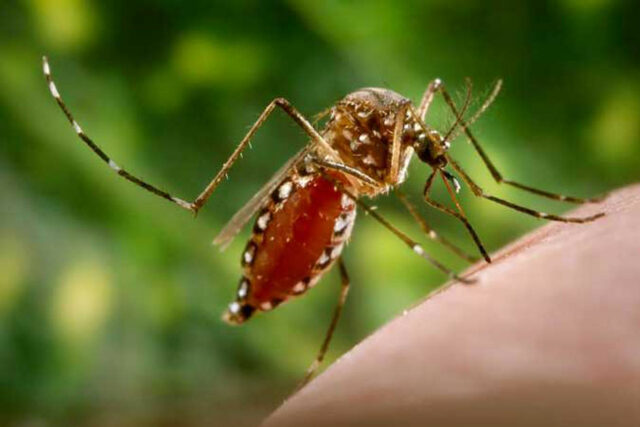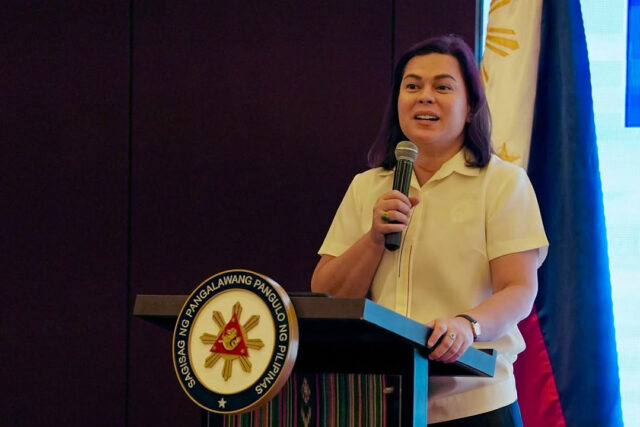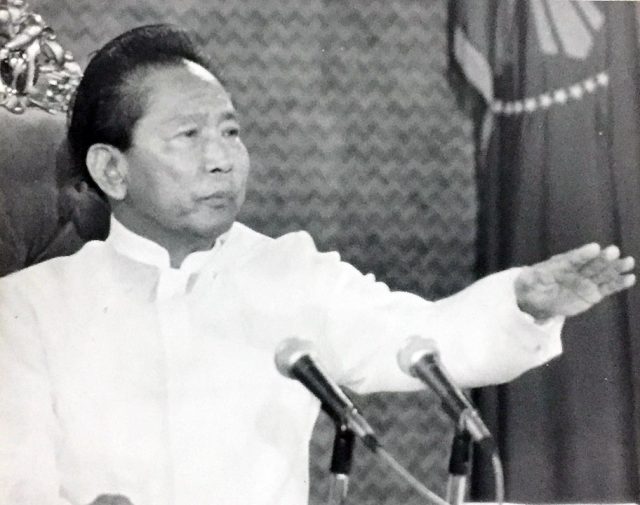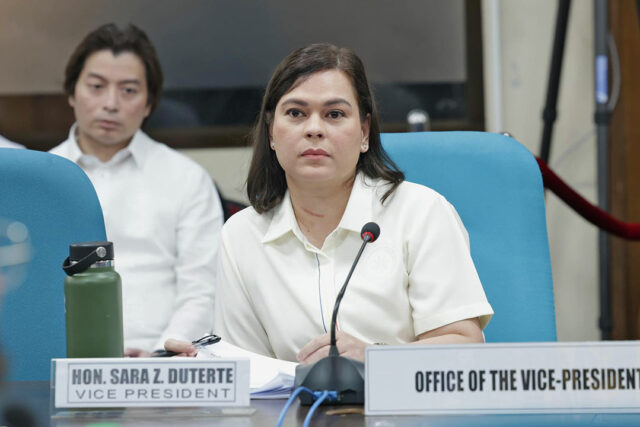Philippines falls to 23rd in 2025 Agility Emerging Markets Logistics Index
The Philippines fell five places to 23rd out of 50 emerging markets with an overall score of 4.91 in the 2025 edition of the Agility Emerging Markets Logistics Index. Its score was lower compared to the 5.06 overall score a year earlier. The index provides a snapshot of each country’s current performance and future potential as a globally significant logistics market and investment destination.
Dengue vaccines safe, doctors say
by Patricia B. Mirasol, Producer

Dengue vaccines are safe, and they are one way of combatting the viral infection spread by mosquitoes, according to doctors at the February 18 launch of Empowering Networks to Defeat (E.N.D.) Dengue coalition.
E.N.D. Dengue, founded by the Philippine Medical Association (PMA), is the largest coalition of doctors dedicated to combating dengue. It aims to strengthen public awareness, prevention, and response efforts across the country.
That the vaccine is ”nakakamatay (can kill) is the number one misinformation,” said Dr. Mildred Manalac-Mariano, secretary general of the PMA, at the launch.
In a letter to President Ferdinand R. Marcos, Jr. dated February 12, PMA “urges the government to grant access to the new-generation dengue vaccines and allow Filipinos the right to protect themselves from this dreadful the disease.”
“With recent advances in vaccine technology,” the letter read, “there are new generation dengue vaccines in the market or in Phase 3 clinical trial which showed promise in terms of vaccine effectiveness and safety.”
“Sa sampung taon na pag-aaral namin ng Qdenga, wala po kaming nakitang masama (In the ten years we’ve studied Qdenga, we have yet to see any ill effects from it),” said Dr. Lulu C. Bravo, head of the vaccine study group of the National Institutes of Health – University of the Philippines Manila.
Qdenga is the biopharamceutical company Takeda’s dengue vaccine. It is undergoing approval with the Philippine Food and Drug Administration.
“Puwede pong mas mahina ang efficacy doon sa mga hindi pa nagkakaroon ng dengue (The vaccine could have a lower efficacy for those who havent’ had dengue yet),” she said at the event.
“Sa bakuna, ang importante hindi kayo ma-ospital at hindi kayo mamatay (When it comes to vaccines, what’s important is that you don’t get hospitalized and you don’t die),” she said, adding that no vaccine can give a 100% assurance that an individual will not fall ill from a disease.
The Department of Health (DoH), in a February 17 statement, says it sees a concerning rise in the number of dengue cases in nine local government units, including Quezon City.
The DoH uses the 5S strategy to prevent dengue:
- search and destroy mosquito breeding sites;
- Self-protection measures (such as the use of insect repellents);
- Seek early consultation
- Support fogging, and
- Sustain hydration.
It reminds the public to practice proper hygiene and self-protection against W.I.L.D diseases (Water and food-borne diseases, Influenza-like illnesses, Leptospirosis, and Dengue) as the country experiences increased rainfall and thunderstorms due to the Shear Line, Intertropical Convergence Zone, and Easterlies increasing the risk of weather-induced diseases.
PSEi rises further as Wall Street ekes out gains
THE MAIN INDEX ended higher on Wednesday to track Wall Street’s climb and amid market optimism over corporate results.
The Philippine Stock Exchange index (PSEi) rose by 0.4% or 24.92 points to end at 6,119.88. On the other hand, the broader all shares index inched down by 0.1% or 3.94 points to 3,675.
“The local bourse extended its rise backed by optimistic expectations towards fourth quarter and full-year 2024 corporate results. The positive cues from Wall Street also helped in Wednesday’s session,” Philstocks Financial, Inc. Senior Research Analyst Japhet Louis O. Tantiangco said in a Viber message.
“Momentum was further sustained when US equities rallied Tuesday as investors shrugged off global trade and inflation concerns, with tariff developments in Washington remaining a wildcard,” Regina Capital Development Corp. Head of Sales Luis A. Limlingan said in a Viber message.
Rizal Commercial Banking Corp. Chief Economist Michael L. Ricafort said in a Viber message that the PSEi extended its climb as US shares gained slightly overnight, boosting most global markets.
Global stocks were steady on Wednesday, with European and US shares at record highs, as traders cautiously shrugged off US President Donald J. Trump’s latest tariff threats on auto, semiconductor and pharmaceutical imports, Reuters reported.
Mr. Trump told reporters on Tuesday that sectoral tariffs on pharmaceuticals and semiconductor chips would start at “25% or higher,” rising substantially over the course of a year. He intends to impose similar tariffs on autos as soon as April 2.
Overnight, the US benchmark S&P 500 squeaked past its previous record closing high as all three Wall Street indexes seesawed between gains and losses for much of the session before rising in the closing minutes.
The Dow Jones Industrial Average increased by 0.02% or 10.26 points to 44,556.34; the S&P 500 gained by 0.24% or 14.95 points to 6,129.58; and the Nasdaq Composite went up by 0.07% or 14.49 points to 20,041.26.
Majority of sectoral indices closed higher on Wednesday. Mining and oil surged by 4.73% or 375.93 points to 8,315.87; property went up by 1.83% or 40.64 points to 2,257.32; industrials climbed by 1.16% or 101.53 points to 8,854.93; and holding firms increased by 0.98% or 49.86 points to 5,126.65.
Meanwhile, financials dropped by 1.05% or 24.06 points to close at 2,259.86, and services went down by 0.46% or 9.35 points to 1,983.47.
Value turnover went down to P5.18 billion on Wednesday with 1.41 billion shares traded from the P6.30 billion with 1.06 billion issues exchanged on Tuesday.
Advancers beat decliners, 98 versus 89, while 59 names were unchanged.
Net foreign selling went up to P515.39 million on Wednesday from P199.76 million on Tuesday. — Revin Mikhael D. Ochave with Reuters
Peso rebounds as markets eye Russia-Ukraine talks
THE PESO went up versus the dollar on Wednesday as sentiment improved amid the start of bilateral talks between the United States and Russia on the war in Ukraine.
The local unit closed at P58.088 per dollar on Wednesday, strengthening by 6.20 centavos from its P58.15 finish on Tuesday, Bankers Association of the Philippines data showed.
The peso opened Wednesday’s trading session weaker at P58.20 against the dollar, which was also its intraday low. Meanwhile, it climbed to as high as P58.07 versus the greenback.
Dollars exchanged went down to $1.25 billion on Wednesday from $1.67 billion on Tuesday.
The peso inched up against the dollar on Wednesday after the start of talks between the US and Russia, Rizal Commercial Banking Corp. Chief Economist Michael L. Ricafort said in a Viber message.
“The peso recovered slightly amid increasing optimism from the ongoing peace talks concerning the Russia-Ukraine war,” a trader likewise said in an e-mail.
For Thursday, the trader said the peso could weaken due to potentially hawkish signals from the minutes of the US Federal Reserve’s policy meeting set to be released overnight.
The trader expects the peso to move between P58 and P58.25 per dollar, while Mr. Ricafort said it could range from P57.95 to P58.15.
US President Donald J. Trump’s administration said on Tuesday it had agreed to hold more talks with Russia on ending the war in Ukraine after an initial meeting that excluded Kyiv, a departure from Washington’s previous approach that rallied US allies to isolate Russian President Vladimir Putin, Reuters reported.
As the 4-1/2-hour meeting in the Saudi capital was underway, Russia hardened its demands, notably insisting it would not tolerate the NATO alliance granting membership to Ukraine.
Later on Tuesday, Mr. Trump said he was more confident after the talks and he would probably meet with Mr. Putin before the end of the month.
“Russia wants to do something,” Mr. Trump told reporters in Palm Beach, Florida. He brushed aside Ukraine’s concern about being left out of the meeting and said Kyiv should have entered talks much earlier.
“I think I have the power to end this war,” said Mr. Trump.
The talks in Riyadh were the first time US and Russian officials met to discuss ways to halt the deadliest conflict in Europe since World War II. Ukraine has said it will not accept any deal imposed without its consent, and German Chancellor Olaf Scholz reiterated “there must be no decision over the heads of Ukraine.”
Even before the talks took place, some European politicians accused Trump’s administration of handing free concessions to Moscow last week by ruling out NATO membership for Ukraine and saying it was an illusion for Kyiv to believe it could win back the 20% of its territory now under Russian control.
US National Security Adviser Mike Waltz told reporters in Riyadh that the war must come to a permanent end, and this would involve negotiations over territory.
“Just a practical reality is that there is going to be some discussion of territory and there’s going to be discussion of security guarantees,” he said.
High-level teams would begin talks on ending the conflict and would separately work to restore the countries’ respective diplomatic missions in Washington and Moscow to ease the talks going forward, US Secretary of State Marco Rubio said.
Mr. Rubio said he came away from the initial talks convinced that Russia was “willing to begin to engage in a serious process” but that reaching peace would involve concessions from all sides.
Russian officials did not mention offering any concessions and US officials did not claim to have scored any in Tuesday’s meeting, leading observers to doubt whether the talks would turn into serious peace negotiations.
Addressing Ukrainian and European concerns, Mr. Rubio said no one was being sidelined and any solution must be acceptable to all parties.
Mr. Rubio later spoke to the top diplomats of France, Germany, Italy, Britain and the EU to brief them on the talks, State Department spokesperson Tammy Bruce said.
Ukrainian President Volodymyr Zelensky said he had postponed a visit to Saudi Arabia planned for Wednesday until next month. Sources familiar with the matter said the decision was made to avoid giving “legitimacy” to the US-Russia talks.
Kyiv says talks on how to end the war should not be held behind Ukraine’s back. — A.M.C. Sy with Reuters
Vice-President Duterte asks tribunal to stop her trial, void impeachment
PHILIPPINE Vice-President Sara Duterte-Carpio has asked the Supreme Court to stop the Senate from trying her after her impeachment by the House of Representatives, making her first legal move to fight the case that could lead to her removal and a lifetime ban from public office.
In a 36-page petition, the daughter of the country’s firebrand former leader also asked the tribunal to nullify her impeachment, accusing congressmen of gravely abusing their discretion by “circumventing and violating” a constitutional safeguard against more than one impeachment proceeding against the same official in a year.
“Unless restrained, the continuation of these proceedings will continue to harm the petitioner and subject her to public scrutiny, despite it being known that the impeachment proceedings against her are purely motivated by politics and personal interests,” Ms. Duterte said.
Named respondents were the House, represented by Speaker Martin G. Romualdez, and the Senate, represented by its chief Senator Francis G. Escudero.
The House impeached Ms. Duterte, who is seen as a strong candidate for the 2028 presidential election, on Feb. 5 for alleged misuse of her budget, unexplained wealth and threatening the lives of Philippine President Ferdinand R. Marcos Jr, the first lady and the Speaker.
More than 200 congressmen filed and signed a fourth impeachment complaint against Ms. Duterte, more than the one-third vote required by the Constitution for her to be impeached.
The House delivered a quick and stunning blow against the estranged vice-president, allowing it to send the ouster charges immediately to the Senate without further hearings, on the last session before a four-month break for midterm elections in May.
The ouster charges consisted of seven articles of impeachment, including allegations of plotting the assassination of the President, misusing secret funds, amassing unexplained wealth and committing acts of destabilization.
She has denied wrongdoing, saying the charges were politically motivated, amid a rift with Mr. Marcos.
The 24 senators will serve as jurors in the impeachment trial that could lead to Ms. Duterte’s removal from office and a lifetime ban from public posts, which would kill off any hope of becoming President.
Administration congressmen in a statement on Wednesday said Ms. Duterte’s “desperate” move was aimed at evading accountability.
Ms. Duterte in her lawsuit said congressmen violated the law by sitting on the first three complaints filed by certain groups in December, practically dismissing these. They are thus barred by law from starting another impeachment complaint within a year.
Ms. Duterte’s supporters earlier filed a separate lawsuit seeking the same reliefs from the High Court. They accused the House of violating her right to due process during the impeachment proceedings.
A separate lawsuit has also been filed asking the court to compel the Senate to start Ms. Duterte’s trial. The tribunal has given the chamber 10 days to comment on the petition.
Her impeachment is a major setback for the influential Duterte family, whose popularity grew rapidly after Rodrigo R. Duterte was swept to power in 2016 as a maverick, crime-busting mayor. As President, he upended Philippine foreign policy and launched a drug war that killed thousands.
The Senate president has said they could not start the impeachment trial until July since the law bars them from doing so while on recess.
Ms. Duterte is one of few Philippine officials who were impeached, among them ex-President Joseph E. Estrada in 2000, Ombudsman Merceditas Gutierrez in March 2011, Chief Justice Renato Corona in December 2011 and election chief Juan Andres D. Bautista in October 2017.
Mr. Corona was convicted by the Senate, while Ms. Gutierrez resigned before she could be tried. Mr. Estrada’s trial was aborted after some House prosecutors walked out after senators voted against opening a document containing evidence. He was later ousted by a street uprising.
Lawmakers will reconvene for a two-week session from June 2 to June 13, according to the congressional calendar.
All House seats and 12 of the 24-member Senate will be replaced in July, two months after Filipinos vote on May 12.
Meanwhile, Mr. Escudero said the Office of the Solicitor General would represent the Senate in the lawsuits involving Ms. Duterte’s impeachment.
“We will refer that matter to the Solicitor General’s office, as a lawyer that will stand on behalf of the government,” he told a news briefing.
He said the congressional break could give the High Court enough time to resolve any issues about the Vice-President’s impeachment trial.
“Perhaps it is providential that we did not proceed with the trial because of the recess, so that all these matters can be referred to the Supreme Court…so that nothing will stop or delay the Senate’s trial by technicalities or issues,” he added. — Norman P. Aquino, Chloe Mari A. Hufana and Adrian H. Halili
US condemns ‘dangerous’ maneuvers by Chinese Navy in South China Sea
By Adrian H. Halili and John Victor D. Ordoñez, Reporters
THE US on Wednesday condemned the “dangerous” maneuvers of a Chinese Navy helicopter that endangered the safety of a Philippine government aircraft patrolling a disputed shoal in the South China Sea.
In a post on X, US Ambassador to the Philippines Mary Kay L. Carlson also urged China to “refrain from coercive actions and settle its disputes peacefully in accordance with international law.”
The Philippines on Tuesday said it was “deeply disturbed” by the Chinese navy’s “unprofessional and reckless” flight actions and that it would file a diplomatic protest.
Manila’s coast guard said the Chinese navy helicopter performed dangerous flight maneuvers when it flew close to a government aircraft conducting surveillance over Scarborough Shoal, endangering the lives of its pilots and passengers.
The People’s Liberation Army Navy helicopter flew as close as three meters to the aircraft, which the Philippine Coast Guard said was a “clear violation and blatant disregard” of aviation regulations.
China disputed the Philippines’ account, saying on Tuesday its aircraft “illegally intruded” into China’s airspace and accused its Southeast Asian neighbor of “spreading false narratives.”
Named after a British ship that was grounded on the atoll nearly three centuries ago, Scarborough Shoal is one of the most contested maritime feature in the South China Sea, where Beijing and Manila have clashed repeatedly.
“The Philippines has undeniable sovereignty and jurisdiction over Bajo de Masinloc,” its National Maritime Council said in a statement, using Manila’s name for the shoal.
“China’s illegal, coercive, and aggressive behavior will not deter the Philippines from continuing the conduct of its routine maritime operations in accordance with its sovereignty over the shoal,” it added.
Senator Ana Theresia N. Hontiveros-Baraquel said China has been stirring trouble by routinely disrespecting international laws.
“(China) is a signatory to the United Nations Convention on the Law of the Sea and a contracting member of the International Civil Aviation Organization, and yet it shamelessly ignores these international norms,” she said in a statement.
China claims over 80% of the waterway in the South China Sea, but the Permanent Court of Arbitration voided its claim in 2016. China rejects this claim.
China claims sovereignty over almost the entire South China Sea, a vital waterway for more than $3 trillion of annual ship-borne commerce, putting it at odds with Brunei, Indonesia, Malaysia, the Philippines and Vietnam.
A United Nations-backed tribunal based in the Hague in 2016 voided China’s claim for being illegal, but Beijing does not recognize the ruling.
Meanwhile, President Ferdinand R. Marcos, Jr. has signed into law a bill that will fix the term of the Philippine Coast Guard (PCG) commandant to three years, which is expected to keep the agency’s leadership structure stable amid tensions with China.
Republic Act No. 12122, which the President signed into law on Feb. 18, gives the PCG chief a three-year term unless relieved from their post.
Senate President Francis G. Escudero earlier said the measure would help the agency secure Manila’s territorial waters and shores.
In October, Mr. Marcos vowed to upgrade the assets and increase the PCG’s fleet to boost maritime domain awareness.
The PCG was under the Department of National Defense before it was transferred to the Office of the President on March 30, 1998 through an order issued by the late President Fidel V. Ramos.
Less than a month later, Mr. Ramos transferred the PCG to the Department of Transportation and Communications, which was split into two separate agencies in 2016 through a law signed by the late President Benigno S.C. Aquino III.
The coast guard launched a transparency campaign in 2023 to expose China’s attacks on its assets, a strategy that has helped Manila gain more support from the international community. — with Reuters
Sandiganbayan dismisses ill-gotten wealth lawsuit against Marcoses
By Kenneth Christiane L. Basilio, Reporter
THE PHILIPPINES’ anti-graft court has dismissed an ill-gotten wealth case against the late dictator Ferdinand E. Marcos, Sr. and his wife Imelda due to decades-long inaction by state prosecutors.
In a 12-page resolution dated Feb. 18, the Sandiganbayan Second Division said the Presidential Commission on Good Government (PCGG) had failed to prosecute the Marcoses for a lawsuit seeking the return of vehicles and household appliances alleged to have been bought with ill-gotten wealth.
“There is no question that the plaintiff (PCGG) has failed to prosecute the case for an unreasonable length of time,” according to a copy of the decision written by Presiding Justice Geraldine Faith A. Econg. “Plaintiff’s unexplained inaction for more than four decades warrants the dismissal of the complaints against the defendant Marcos spouses.”
State prosecutors filed their complaint against the Marcoses in July 1987 seeking the return of 21 cars worth about P5 million and household appliances that were alleged to have been unlawfully acquired.
The Sandiganbayan ordered the forfeiture of the vehicles and appliances to the PCGG in 1989, but this was overturned three years later after Imelda R. Marcos, wife of Mr. Marcos, said in a motion they were not able to respond to the ill-gotten wealth allegations since they had been in exile in the US.
Government prosecutors challenged the anti-graft court’s reversal order in 1992 by lodging petitions before it and the Supreme Court. The motions were quashed in 1993 and 1994, citing Mrs. Marcos’ “meritorious” plea.
“Decades passed and the status of the proceedings was left unsettled. Hence, on Jan. 21, 2025, a case conference was scheduled by the court to put the present complaint to close,” the anti-graft court said.
PCGG lawyers did not object to the termination of the case since they had recovered the assets due to the court’s earlier forfeiture order.
“Even with the partial satisfaction of the writ of execution, there remains an unresolved issue left for adjudication, and a concomitant duty of the plaintiff as a claiming party to prosecute the same,” the court said.
“So viewed, the dismissal of the instant complaint against defendant Marcos spouses for actual, moral, temperate, nominal and exemplary damages and attorney’s fees is proper,” it added.
The late dictator, the father and namesake of the current Philippine President, served as president for two-decades, during which he stole as much as $10 billion (P581 billion) from the Filipino people, according to PCGG estimates.
Government prosecutors tried to go after the ill-gotten wealth of the Marcoses after the late dictator was toppled by a popular street uprising in February 1986. The PCGG had recovered about P280 billion of the assets as of 2023, according to the agency’s audit report posted on its website.
Gov’t think-tank calls for regulatory body, reforms to boost train use, modernization
THE Philippine government should consider establishing a rail regulatory agency to protect commuters from price gouging and ensure that rail transportation infrastructure projects are on-track, according to a congressional think-tank.
Reducing traffic congestion in Metro Manila requires the government to advocate for the use of railway systems further by making train fares cheap, the Congressional Policy and Budget Research Department (CPBRD) said in a February report.
“Leaving the rail sector fully into the hands of the private sector could result in negative externalities and market failures. Lack of market regulation, especially in ensuring competition and addressing anti-competitive practices, will allow private operators to maximize their profits in rail operations without regard to public welfare,” CPBRD author Ricardo P. Mira said in the 27-page discussion paper.
“The government should take the lead in promoting a culture of rail commuting among Filipinos by ensuring fast, safe, reliable, and reasonably-priced rail transport services,” he added.
The Philippines is hard-pressed to decongest heavy traffic in Metro Manila, which the TomTom Traffic Index found to be the 14th most congested city in the world in 2024. Commuters in the city take around 32 minutes to travel 10 kilometers (km) on average, the report noted.
The Southeast Asian nation also has the shortest railway system among its regional neighbors, with only 228 km of total track length, according to 2023 data from the Association of Southeast Asian Nations. It follows Singapore (259 km), Laos (423.5 km), Cambodia (652 km), Malaysia (1,799.4 km), Vietnam (2,646.1 km), Thailand (5,098.2 km), and Indonesia (5,483 km).
Railway operators should also reduce service interruptions caused by technical and operational issues to further boost the use of public trains, the think-tank said. “Successful urban rail development is usually associated with careful planning of network and modal integration.”
Policymakers should also look at regulating private car ownership in Metro Manila to maximize investments in railway upgrades, it added.
“This policy should not only mitigate traffic congestion but also promote rail patronage among vehicle owners.”
Moreover, lawmakers could prioritize proposed amendments to the 2016 Right-of-Way (ROW) Act to help advance railway construction projects amid ROW issues, the think-tank said.
At present, the government is required to relocate residents affected by railway projects and provide compensation for underground boring and construction activities.
November 2024 data from the Department of Transportation (DoTr) showed that only 1,756 out of 50,633 informal settlers have been relocated.
Further, the report noted that the ROW law provided property owners rights to their land up to 50 meters below ground level. This means the government can enter into and use subsurface or subterranean portions more than 50 meters from the surface.
“An important amendment relevant to the rail sector is the proposed reduction of the subterranean ROW from 50 meters to 15 meters from the surface, which could allow the DoTr and other government agencies to build more subterranean infrastructure in the future,” it said.
“This makes economic sense because it will help relieve the government from compensating costly subterranean ROW in future subway projects,” it added.
The House of Representatives approved on third reading its version of the measure in February 2023, with its counterpart proposal in the Senate pending plenary deliberations. — Kenneth Christiane L. Basilio
PHL secures P1-B EU grant

THE PHILIPPINES has received a P1-billion (€16.5-million) grant from the European Union (EU) for a program that will protect the rights of Filipinos for a responsive justice system, Finance Secretary Ralph G. Recto said on Wednesday.
Mr. Recto said in a statement the grant agreement for the Enabling Justice and Rule of Law in the Philippines of the Justice Sector Coordinating Council was signed on Nov. 22.
The grant aims to contribute to the socio-economic development of the country “by creating a more effective, inclusive, and accountable justice system,” the statement read.
“This agreement is of great importance to us because we recognize that economic progress and the rule of law must go hand in hand,” Mr. Recto said in his opening remarks at the ceremonial exchange of document on Wednesday.
It will improve legal aid services for marginalized groups by boosting the capacities of local justice sector actors and will straighten coordination between the justice institutions. — Aubrey Rose A. Inosante
Immediate action on VP ouster urged
A POLITICAL group on Wednesday called on the Philippine Senate to immediately hold the impeachment trial against Vice-President (VP) Sara Duterte-Carpio.
In a position paper, Bayan Muna Chairperson Neri J. Colmenares asked President Ferdinand R. Marcos, Jr. to call for a special session compelling senators to convene as an impeachment court without their permission. The paper was also backed by the impeachment counsel for activists who filed the second ouster charge against the embattled vice-president.
The Senate could also begin soliciting Ms. Duterte’s response to the allegations contained in the impeachment complaint submitted to the Senate in early February, he added, which was signed by more than one-third of congressmen.
“We call for the immediate convening of the impeachment court, and for the speedy disposition of the impeachment case,” Mr. Colmenares said in his eight-page position paper.
The Office of the Vice-President did not immediately respond to an e-mail seeking comment.
Civil society groups, activists and clergymen separately filed three impeachment complaints against Ms. Duterte in December. More than 200 congressmen filed and endorsed a fourth complaint that was directly sent to the Senate before Congress went on a four-month break early this month. — Kenneth Christiane L. Basilio
Comelec warns vs discrimination
THE Commission on Elections (Comelec) reminded campaigners to not use the election to discriminate against vulnerable sectors, persons with disability (PWDs) and women.
According to the 10-page resolution, violators would be slapped with an election offense.
 The resolution will be applied during the election period for the midterm election and the Bangsamoro Autonomous Region of Muslim Mindanao (BARMM) Parliamentary Elections.
The resolution will be applied during the election period for the midterm election and the Bangsamoro Autonomous Region of Muslim Mindanao (BARMM) Parliamentary Elections.
The campaign period for senatorial and party-list candidates started on Feb. 11, while local bets will start their campaign on March 28.
Up for grabs in the May 12 elections are 317 congressional seats and thousands of local posts. The biggest battle will be for 12 spots in the 24-seat Senate, a chamber packed with political heavyweights and wielding outsized influence. — Chloe Mari A. Hufana














